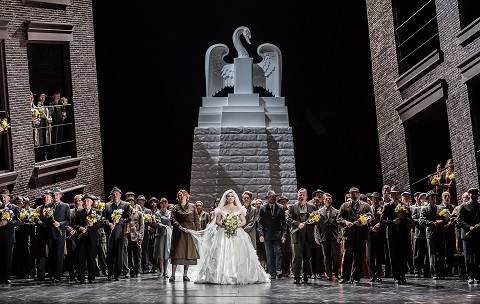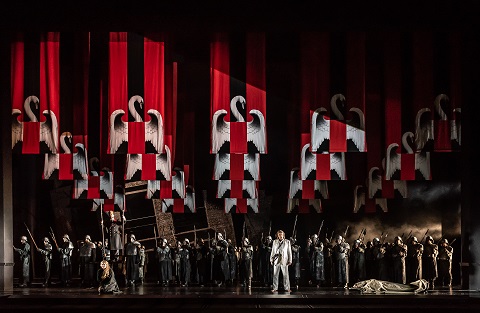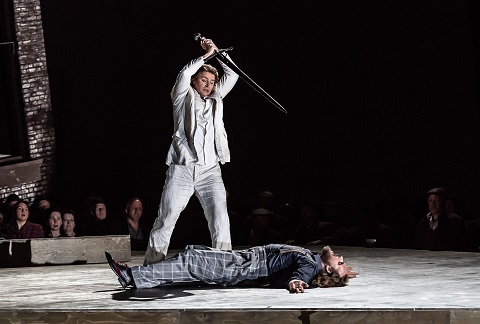
12 Jun 2018
Lohengrin at the Royal Opera House
Since returning to London in January, I have been heartened by much of what I have seen - and indeed heard - from the Royal Opera.
English Touring Opera are delighted to announce a season of lyric monodramas to tour nationally from October to December. The season features music for solo singer and piano by Argento, Britten, Tippett and Shostakovich with a bold and inventive approach to making opera during social distancing.
This tenth of ten Live from London concerts was in fact a recorded live performance from California. It was no less enjoyable for that, and it was also uplifting to learn that this wasn’t in fact the ‘last’ LfL event that we will be able to enjoy, courtesy of VOCES8 and their fellow vocal ensembles (more below …).
Ever since Wigmore Hall announced their superb series of autumn concerts, all streamed live and available free of charge, I’d been looking forward to this song recital by Ian Bostridge and Imogen Cooper.
The Sixteen continues its exploration of Henry Purcell’s Welcome Songs for Charles II. As with Robert King’s pioneering Purcell series begun over thirty years ago for Hyperion, Harry Christophers is recording two Welcome Songs per disc.
Although Stile Antico’s programme article for their Live from London recital introduced their selection from the many treasures of the English Renaissance in the context of the theological debates and upheavals of the Tudor and Elizabethan years, their performance was more evocative of private chamber music than of public liturgy.
In February this year, Albanian soprano Ermonela Jaho made a highly lauded debut recital at Wigmore Hall - a concert which both celebrated Opera Rara’s 50th anniversary and honoured the career of the Italian soprano Rosina Storchio (1872-1945), the star of verismo who created the title roles in Leoncavallo’s La bohème and Zazà, Mascagni’s Lodoletta and Puccini’s Madama Butterfly.
Evidently, face masks don’t stifle appreciative “Bravo!”s. And, reducing audience numbers doesn’t lower the volume of such acclamations. For, the audience at Wigmore Hall gave soprano Elizabeth Llewellyn and pianist Simon Lepper a greatly deserved warm reception and hearty response following this lunchtime recital of late-Romantic song.
Collapsology. Or, perhaps we should use the French word ‘Collapsologie’ because this is a transdisciplinary idea pretty much advocated by a series of French theorists - and apparently, mostly French theorists. It in essence focuses on the imminent collapse of modern society and all its layers - a series of escalating crises on a global scale: environmental, economic, geopolitical, governmental; the list is extensive.
For this week’s Live from London vocal recital we moved from the home of VOCES8, St Anne and St Agnes in the City of London, to Kings Place, where The Sixteen - who have been associate artists at the venue for some time - presented a programme of music and words bound together by the theme of ‘reflection’.
'Such is your divine Disposation that both you excellently understand, and royally entertaine the Exercise of Musicke.’
Amongst an avalanche of new Mahler recordings appearing at the moment (Das Lied von der Erde seems to be the most favoured, with three) this 1991 Mahler Second from the 2nd Kassel MahlerFest is one of the more interesting releases.
‘And there was war in heaven: Michael and his angels fought against the dragon; and the dragon fought and his angels, And prevailed not; neither was their place found any more in heaven … that old serpent … Satan, which deceiveth the whole world: he was cast out into the earth, and his angels were cast out with him.’
If there is one myth, it seems believed by some people today, that probably needs shattering it is that post-war recordings or performances of Wagner operas were always of exceptional quality. This 1949 Hamburg Tristan und Isolde is one of those recordings - though quite who is to blame for its many problems takes quite some unearthing.
There was never any doubt that the fifth of the twelve Met Stars Live in Concert broadcasts was going to be a palpably intense and vivid event, as well as a musically stunning and theatrically enervating experience.
‘Love’ was the theme for this Live from London performance by Apollo5. Given the complexity and diversity of that human emotion, and Apollo5’s reputation for versatility and diverse repertoire, ranging from Renaissance choral music to jazz, from contemporary classical works to popular song, it was no surprise that their programme spanned 500 years and several musical styles.
The Academy of St Martin in the Fields have titled their autumn series of eight concerts - which are taking place at 5pm and 7.30pm on two Saturdays each month at their home venue in Trafalgar Square, and being filmed for streaming the following Thursday - ‘re:connect’.
The London Symphony Orchestra opened their Autumn 2020 season with a homage to Oliver Knussen, who died at the age of 66 in July 2018. The programme traced a national musical lineage through the twentieth century, from Britten to Knussen, on to Mark-Anthony Turnage, and entwining the LSO and Rattle too.
With the Live from London digital vocal festival entering the second half of the series, the festival’s host, VOCES8, returned to their home at St Annes and St Agnes in the City of London to present a sequence of ‘Choral Dances’ - vocal music inspired by dance, embracing diverse genres from the Renaissance madrigal to swing jazz.
Just a few unison string wriggles from the opening of Mozart’s overture to Le nozze di Figaro are enough to make any opera-lover perch on the edge of their seat, in excited anticipation of the drama in music to come, so there could be no other curtain-raiser for this Gala Concert at the Royal Opera House, the latest instalment from ‘their House’ to ‘our houses’.
"Before the ending of the day, creator of all things, we pray that, with your accustomed mercy, you may watch over us."

Since returning to London in January, I have been heartened by much of what I have seen - and indeed heard - from the Royal Opera.
If Barrie Kosky’s Carmen proved something of a flop, there has been much to ponder and indeed to inspire from Krzysztof Warlikowski’s From the House of the Dead , superlatively conducted by Mark Wigglesworth, and most recently, George Benjamin’s new operatic masterpiece, Lessons in Love and Violence . David Alden is perhaps not the most obvious directorial choice for Wagner, though his ENO Tristan - the first I saw - certainly had its merits. He pretty much had the field to himself, though, given that Covent Garden’s previous staging was the lamentable fancy-dress pageant served up by Elijah Moshinsky, its final reheating coming as late as 2009 . On the face of it, Alden’s move to the 1930s must have come to a shock to the more reactionary elements always present in a Wagner audience. That it does not seem to have done so suggests either a welcome opening of minds or something - at least, according to one reading, like Lohengrin - rather less substantial than one might have initially presumed.
 Photo credit: Clive Barda.
Photo credit: Clive Barda.
I wish it had been the former but Alden’s production ultimately proved conventional, all too conventional: more a potential shell for something more interesting than a remotely finished - even ready - production in itself. Designs and some stage direction, notably that of the chorus, are suggestive, but where is the dramatic grit? To offer a Lohengrin come as redeemer to a society broken by war is of course to follow Wagner precisely; to shift the actual war to something closer to our modern concerns is no bad thing at all. He unifies a people in disarray through his charismatic authority, yet ultimately cannot fulfil his duty and rejects his people.
Nazi parallels, or rather premonitions - like Marx, Wagner is often at his very strongest in pointing to where the twentieth and twenty-first centuries would go wrong - are obvious, yet none the worse for that. Even that level of critique will, after all, stand as a rebuke to those who follow that disingenuous old Nazi, Curt von Westernhagen, railing against the fresh theatrical wind of the 1970s: ‘Directors who deem themselves progressive when they transform the Ring back into a drama with a “message” have no idea how regressive this approach is in relation to the genesis of the work itself.’ Westernhagen’s scholarly methods are now as discredited as his ideology. Disciples remain, though, and few things get them so hot under the collar as Nazis on stage. Clue: they like it, really .
That said, simply to update is never enough. Indeed, it is to adopt the Westernhagen fraternity’s strange delusion that a production more or less is its designs (here, handsome indeed, for which great credit should be accorded to Paul Steinberg in particular). In many ways, when and where something is set, or is not, is the least interesting thing of all; at best, it is a starting-point. Save for that arresting, almost cinematic (Riefenstahl at a push) direction of crowd movement, its dramatic import obvious yet undeniably powerful, there is not much to get one’s teeth into. If the setting remains largely undeveloped, too much also seems awkwardly reminiscent of other productions. Had you never seen a German Lohengrin, you might remain, often literally, in the dark; Wagner and indeed many in his audiences surely deserve greater credit than that.
 Klaus Florian Vogt as Lohengrin, Thomas J. Mayer as Friedrich von Telramund. Photo credit: Clive Barda.
Klaus Florian Vogt as Lohengrin, Thomas J. Mayer as Friedrich von Telramund. Photo credit: Clive Barda.
A King Henry whose hunched body language was a little too close to comfort to that of Hans Neuenfels’s Bayreuth production is one thing, but a falling of banners for war that aped the close of the second act of Stefan Herheim’s Parsifal is another again. If some point had been made about Wagner, the Nazis, and Bayreuth, it might have worked, I suppose; here, it seemed gratuitous and frankly derivative. What the point of describing the pages as ‘four women at the wedding’ may have been I do not know: if you like that sort of thing, then that will doubtless be the sort of thing you like. A sudden design apparition from Neuschwanstein seems merely a change of scene. Again, one can see why such an image might have a point in a fascist, even Nazi, setting, but it needs at some level to be made, not merely assumed. Dramatic motivation, then, largely eluded me. Such irritations pointed to a greater problem: a conceptual weakness at the heart. I suspect it can be remedied: if a shell, it is a fine shell. It will not, however, remedy itself.
Perhaps the same once had been true of Moshinsky. At any rate, this evening shared something else important with that final outing of 2009: musical excellence. Andris Nelsons, who conducted Neuenfels’s production at Bayreuth, was not at his strongest here, especially in the first act. Indeed, there both Nelsons and Alden seemed intent, consciously or otherwise, to underline what can often seem to be its rather static nature rather than to enliven the drama. However, Nelsons drew increasingly lovely playing from the orchestra, lower strings and woodwind in particular, and made often quite extreme second-act rubato - not to be confused with tempo variation - work, rather than seem merely mannered. His command of the architecture in the second and third acts impressed. Still more so did the outstanding singing from the chorus and extra chorus. William Spaulding’s work here is clearly reaping rewards, just as it did at Berlin’s Deutsche Oper .
Klaus Florian Vogt’s Lohengrin is a known quantity: known also, of course, to Nelsons from Bayreuth. I am less enthusiastic than once I was: the purity is less consistently apparent, the blandness more so. (Or maybe I am just tired of it.) However, it remains impressive on its own terms; one’s response to his singing will perhaps be more than usually personal. Replacing the originally advertised Kristine Opolais, Jennifer Davis impressed greatly as Elsa. This was by any standards a high-profile debut. Vocal and dramatic sincerity were matched by a security one had little right to expect. Thomas Johannes Mayer, also of recent Bayreuth fame, more than hinted at a properly complex Telramund, even if his artistry received little help from the staging. Christine Goerke’s Ortrud climaxed in properly blood curdling cries at the close, although again I had the impression a deeper production would have brought out something - well, deeper. Georg Zeppenfeld did what he could with the Neuenfels King-redux; that again was impressive indeed. Only Kostas Smoriginas, as his Herald, disappointed: often uncertain of verbal and musical line alike.
 Christine Goerke as Ortrud, Jennifer Davis as Elsa von Brabant, Klaus Florian Vogt as Lohengrin. Photo credit: Clive Barda.
Christine Goerke as Ortrud, Jennifer Davis as Elsa von Brabant, Klaus Florian Vogt as Lohengrin. Photo credit: Clive Barda.
The audience, part of one’s experience whether we like it or not - unless one happens to be Ludwig II, and even then… - proved something of a trial. Someone’s telephone vibrated throughout the first minute or so of the first-act Prelude, the culprit eventually shouting ‘Yes! I’m going to turn it off’. A friend heard someone else announce upon Lohengrin’s arrival: ‘I prefer it when he wears golden armour.’ Coughing, electronic terrorism, and inanity aside, they seemed to like the production: rarely a good sign. Given what they will boo… Still, there is, I am sure, room for something more to take shape within its framework; perhaps they will do so then. Moreover, there is, I assure you, a genuinely exciting prospect for the new Lohengrin at Bayreuth this year. At least on this occasion, my lips must remain better sealed than Elsa’s. The world, however, is likely to see a worthy successor to Neuenfels from Yuval Sharon, in a production that penetrates more deeply to the work’s essence and grapples with its implications.
Mark Berry
King Henry the Fowler: Georg Zeppenfeld; Lohengrin - Klaus Florian Vogt; Elsa: Jennifer Davis; Friedrich von Telramund: Thomas Johannes Mayer; Ortrud: Christine Goerke; King’s Herald: Kostas Smoriginas; Brabantian Nobles: Konu Kim, Thomas Atkins, Gyula Nagy, Simon Shibambu; Pages: Katy Batho, Deborah Peake-Jones, Dervla Ramsay, Louise Armit; Gottfried: Michael Curtis. Director: David Alden; Set Designs: Paul Steinberg: Costumes: Gideon Davey; Lighting: Adam Silverman; Video: Tal Rosner; Movement: Maxine Braham. Royal Opera Chorus and Extra Chorus (chorus director: William Spaulding)/Orchestra of the Royal Opera House/Andris Nelsons (conductor). Royal Opera House, London, Thursday 7 June 2018.